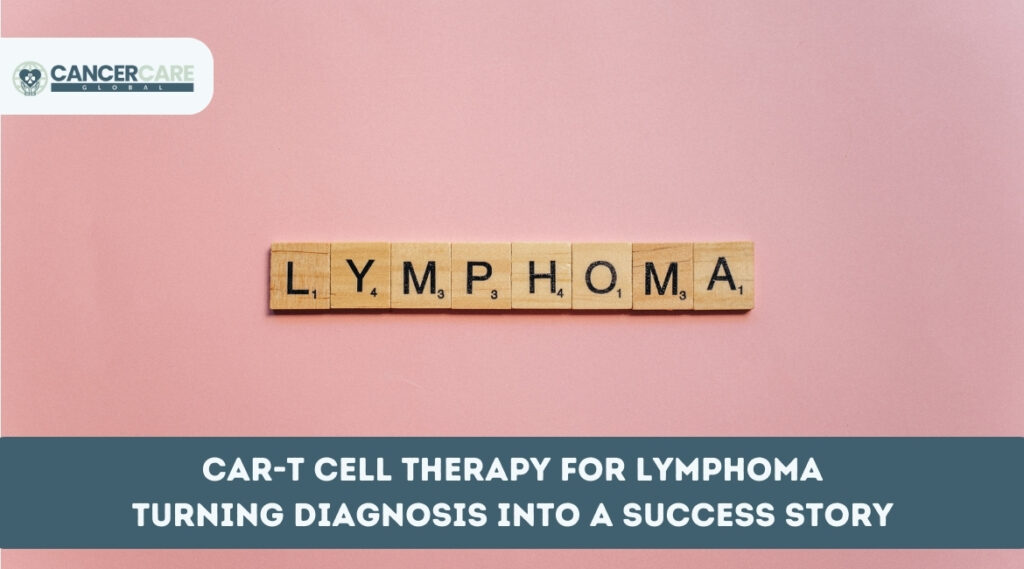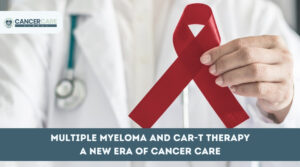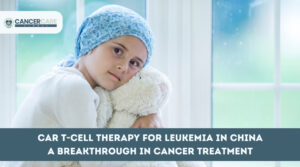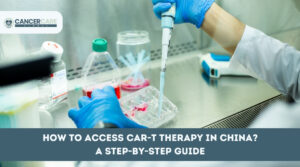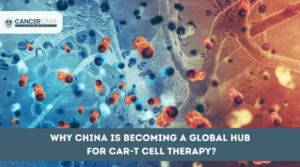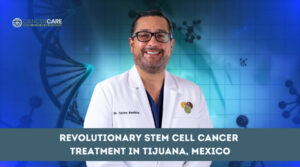Lymphoma, a type of blood cancer originating in the lymphatic system, affects numerous individuals worldwide. Traditional treatments like chemotherapy and radiation have been the mainstay for years. However, advancements in immunotherapy, particularly Chimeric Antigen Receptor (CAR) T-cell therapy, have revolutionized lymphoma treatment, offering new hope to patients.
Key Insights at a Glance
- CAR T-cell therapy harnesses the body’s immune system to target and destroy lymphoma cells.
- It has shown significant efficacy in treating Diffuse Large B-Cell Lymphoma (DLBCL), Mantle Cell Lymphoma, and Follicular Lymphoma.
- Compared to traditional treatments, CAR T-cell therapy offers targeted action with potential for long-term remission.
- Patients should consider factors like eligibility, potential side effects, and treatment costs before opting for CAR T-cell therapy.
- Consultation with a specialized medical team is crucial to determine the most appropriate treatment plan.
Understanding Lymphoma
Lymphoma is a cancer that begins in the lymphocytes, a type of white blood cell integral to the immune system. It primarily affects lymph nodes, spleen, thymus, bone marrow, and other parts of the body.
Types of Lymphoma
- Hodgkin Lymphoma (HL): Characterized by the presence of Reed-Sternberg cells.
- Non-Hodgkin Lymphoma (NHL): A diverse group of blood cancers that includes:
- Diffuse Large B-Cell Lymphoma (DLBCL): The most common NHL subtype, known for its aggressive nature.
- Mantle Cell Lymphoma: A rare and aggressive form of NHL.
- Follicular Lymphoma: A slow-growing type of NHL.
Symptoms of Lymphoma
- Swollen lymph nodes in the neck, armpits, or groin.
- Persistent fatigue and weakness.
- Fever and night sweats.
- Unexplained weight loss.
- Shortness of breath or chest pain.
Traditional Treatments for Lymphoma
Traditional lymphoma treatments include:
- Chemotherapy: Utilizes drugs to kill rapidly dividing cancer cells but can also affect healthy cells, leading to side effects.
- Radiation Therapy: Employs high-energy radiation to target and destroy cancer cells in specific areas.
- Immunotherapy: Boosts the body’s immune system to fight cancer.
- Stem Cell Transplant: Replaces diseased bone marrow with healthy stem cells after high-dose chemotherapy or radiation.
While these treatments can be effective, they often come with significant side effects and may not always lead to long-term remission, especially in aggressive or refractory cases.
Introduction to CAR T-Cell Therapy
CAR T-cell therapy is a form of immunotherapy that modifies a patient’s T-cells to recognize and attack cancer cells. This personalized treatment has shown promise, particularly for certain types of lymphoma.
How CAR T-Cell Therapy Works
- T-Cell Collection: T-cells are extracted from the patient’s blood.
- Genetic Modification: In the laboratory, these T-cells are engineered to express chimeric antigen receptors (CARs) that specifically target proteins on lymphoma cells.
- Cell Expansion: The modified T-cells are multiplied to sufficient numbers.
- Reinfusion: The engineered T-cells are infused back into the patient’s bloodstream, where they seek out and destroy cancer cells.
CAR T-Cell Therapy for Specific Lymphomas
Diffuse Large B-Cell Lymphoma (DLBCL)
DLBCL is an aggressive form of NHL. CAR T-cell therapies like Tisagenlecleucel (Kymriah) and Axicabtagene Ciloleucel (Yescarta) have been approved for treating relapsed or refractory DLBCL. These therapies target the CD19 antigen present on B-cells, leading to the destruction of malignant cells.
Mantle Cell Lymphoma
Mantle Cell Lymphoma is a rare and aggressive subtype of NHL. Brexucabtagene Autoleucel (Tecartus) is a CAR T-cell therapy approved for treating relapsed or refractory mantle cell lymphoma. It also targets the CD19 antigen, providing a new treatment avenue for patients who have not responded to other therapies.
Follicular Lymphoma
Follicular Lymphoma is a slow-growing NHL subtype. CAR T-cell therapies such as Tisagenlecleucel (Kymriah) and Axicabtagene Ciloleucel (Yescarta) have been approved for treating relapsed or refractory follicular lymphoma, offering hope for patients with limited options.
Comparing Traditional Treatments vs. CAR T-Cell Therapy
| Aspect | Traditional Treatments | CAR T-Cell Therapy |
|---|---|---|
| Mechanism | Targets rapidly dividing cells, affecting both cancerous and healthy cells. | Specifically engineered to target cancer cells, sparing most healthy cells. |
| Efficacy | Varies; some patients may not achieve remission or may relapse. | High remission rates, even in patients with refractory or relapsed lymphoma. |
| Side Effects | Includes hair loss, fatigue, infections, and organ toxicity. | Potential for cytokine release syndrome (CRS) and neurological effects, but generally fewer long-term side effects. |
| Treatment Duration | Multiple cycles over several months. | Typically a one-time treatment with a shorter overall duration. |
| Cost | Can be high, especially with prolonged treatment and hospital stays. | High upfront cost, but may be offset by reduced need for ongoing treatments. |
| Availability | Widely available in many healthcare settings. | Available at specialized centers with expertise in CAR T-cell therapy. |
Considerations Before Opting for CAR T-Cell Therapy
Before choosing CAR T-cell therapy, patients should consider:
- Eligibility: Not all patients qualify; eligibility depends on factors like overall health, type of lymphoma, and prior treatments.
- Side Effects: Potential for serious side effects like CRS and neurological toxicities; requires close monitoring.
- Cost: High upfront costs; patients should consult with healthcare providers and insurance companies regarding coverage.
- Access: Availability may be limited to specialized treatment centers.
- Clinical Trials: Participation in clinical trials may provide access to CAR T-cell therapy and help advance research.
Did You Know?
- CAR T-cell therapy was first approved by the FDA in 2017 for treating certain blood cancers.
- Tisagenlecleucel (Kymriah) was the first CAR T-cell therapy approved for DLBCL.
- Axicabtagene Ciloleucel (Yescarta) is another CAR T-cell therapy used for treating DLBCL and follicular lymphoma.
- Brexucabtagene Autoleucel (Tecartus) is specifically approved for mantle cell lymphoma.
CAR T-Cell Therapy in China: A Growing Leader in Cancer Treatment
China has rapidly emerged as a global leader in CAR T-cell therapy, making significant advancements in research, clinical trials, and accessibility. The country’s strong investment in biotechnology and cell-based cancer treatments has accelerated the development of CAR T-cell therapy for lymphoma in China and other blood cancers.
Why is CAR T-Cell Therapy Expanding in China?
- Government and Private Sector Investments – China has invested heavily in immunotherapy research, leading to a surge in clinical trials and treatment availability.
- High Number of Clinical Trials – China has one of the highest numbers of CAR T-cell therapy clinical trials, testing its effectiveness in Diffuse Large B-Cell Lymphoma (DLBCL), Mantle Cell Lymphoma, and Follicular Lymphoma.
- Faster Regulatory Approvals – The National Medical Products Administration (NMPA) has approved several CAR T-cell therapies for commercial and clinical use.
- Lower Costs Compared to Western Countries – While CAR T-cell therapy is expensive worldwide, China’s efficient production and healthcare policies make it more affordable than in the U.S. and Europe.
China’s Approved CAR T-Cell Therapies for Lymphoma
| Therapy Name | Target Antigen | Lymphoma Type | Approval Status |
|---|---|---|---|
| Relmacabtagene Autoleucel (Relma-cel) | CD19 | DLBCL, Follicular Lymphoma | Approved in China |
| Carteyva (Arelcabtagene Autoleucel) | CD19 | DLBCL, Mantle Cell Lymphoma | Approved in China |
| Other investigational therapies | CD19/CD20 | Various Lymphomas | Under Clinical Trials |
Cost of CAR T-Cell Therapy in China
While CAR T-cell therapy is expensive, the cost of CAR T-Cell in China is generally lower than in the U.S. or Europe. The pricing depends on various factors, including treatment complexity, hospitalization, and post-treatment care.
Estimated Cost Breakdown in China
| Treatment Component | Estimated Cost (USD) | Notes |
|---|---|---|
| T-Cell Collection & Processing | $5,000 – $10,000 | Includes blood separation and genetic engineering |
| CAR T-Cell Manufacturing | $25,000 – $50,000 | Advanced lab expansion and testing |
| Infusion & Hospitalization | $10,000 – $20,000 | Includes monitoring for side effects like CRS |
| Post-Treatment Care | $5,000 – $15,000 | Follow-ups, medications, and supportive care |
| Total Estimated Cost | $50,000 – $120,000 | Varies by hospital and patient needs |
By comparison, the cost of CAR T-cell therapy in the U.S. can exceed $400,000, making China an attractive option for medical tourism and domestic patients.
FAQs About CAR T-Cell Therapy for Lymphoma
1. Who is eligible for CAR T-cell therapy?
Patients with relapsed or refractory DLBCL, Mantle Cell Lymphoma, or Follicular Lymphoma who have not responded to chemotherapy or other treatments may be eligible.
2. How effective is CAR T-cell therapy for lymphoma?
CAR T-cell therapy has shown remission rates of 60% to 90%, depending on the type and stage of lymphoma. Many patients experience long-term remission.
3. How long does the treatment process take?
The entire process, from T-cell collection to infusion and recovery, takes about 3 to 4 weeks, with additional monitoring for up to 2 months.
4. What are the most common side effects?
- Cytokine Release Syndrome (CRS): Flu-like symptoms, fever, and low blood pressure.
- Neurological Effects: Confusion, memory loss, or difficulty speaking.
- B-Cell Aplasia: Reduced normal B-cells, increasing infection risk.
5. Can CAR T-cell therapy be combined with other treatments?
Some studies are exploring combining CAR T-cell therapy with other immunotherapies or targeted drugs to improve effectiveness and reduce relapse rates.
6. Is CAR T-cell therapy available for children?
Yes, CAR T-cell therapy has been approved for pediatric patients with B-cell leukemia and lymphoma, under strict eligibility criteria.
7. How long does remission last after CAR T-cell therapy?
Some patients remain cancer-free for several years, while others may experience a relapse, requiring additional treatment or a second CAR T-cell infusion.
8. Can foreign patients receive CAR T-cell therapy in China?
Yes, several hospitals and research centers in China accept international patients for CAR T-cell therapy, often at lower costs than in Western countries.
9. What happens if CAR T-cell therapy fails?
If lymphoma returns after CAR T-cell therapy, doctors may recommend additional immunotherapy, stem cell transplants, or clinical trial participation.
10. Are there ongoing clinical trials in China for new CAR T-cell therapies?
Yes, China has hundreds of clinical trials focused on improving safety, expanding lymphoma indications, and enhancing CAR T-cell durability.

